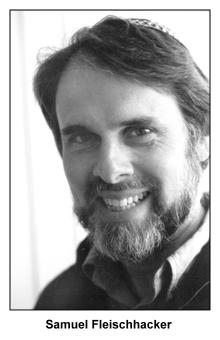SAMUEL FLEISCHACKER
Samuel Fleischacker美国芝加哥的伊利诺斯大学哲学系一名教授,他就读于耶鲁大学,在1989年获得博士学位,他教授政治哲学、哲学历史、道德哲学和宗教哲学。他特别感兴趣的道德地位的文化之间的问题,自然和历史的自由主义和道德之间的关系和其他价值(审美价值,宗教价值,政治价值观念)。
他的出版物包括伦理文化(康奈尔大学Cornell,1994年),第三个自由概念:评判自由的康德和亚当·斯密(普林斯顿Princeton,1999年),论亚当斯密的国家财富:一个哲学伴侣(普林斯顿Princeton,2003年),和平等分配简史(哈佛大学Harvard, 2004年)。Samuel Fleischacker教授在普林斯顿大学一直是人性价值中心研究员、爱丁堡大学人文高等研究院研究员和人文国际铁路联盟研究所研究员,他曾任教于威廉姆斯学院。
Samuel Fleischacker is a Professor. He studied at Yale University, receiving his Ph.D. in 1989. He works in moral and political philosophy, the history of philosophy, aesthetics and the philosophy of religion. Among the issues that have particularly interested him are the moral status of culture, the nature and history of liberalism, and the relationship between moral and other values (aesthetic values, religious values, political values). His publications include The Ethics of Culture (Cornell, 1994), A Third Concept of Liberty: Judgment and Freedom in Kant and Adam Smith (Princeton, 1999), On Adam Smith’s Wealth of Nations: A Philosophical Companion (Princeton, 2003), and A Short History of Distributive Justice (Harvard, 2004). Professor Fleischacker has been a Fellow of the University Center for Human Values at Princeton, the Institute for Advanced Study in the Humanities at Edinburgh University, and The Institute for the Humanities at UIC. He taught previously at Williams College.
电话:(312)413-1026传真:(312)413-2093
Life is a journey for all of us, but Samuel Fleischacker has come farther than most: from a European childhood to an American life, from a small town to a big city, from a liberal Jewish community to an observant one, from writing about culture and ethics to undertaking a study of religion and the Torah as the subject of his next book.
Now he has embarked on a venture that observers view as variously necessary and quixotic: bringing Jews and Muslims together to discuss not only the issues that unite them, but also those that divide.
Fleischacker is first of all a professor in the philosophy department at the University of Illinois at Chicago, his academic home since 1999. He has published five books, dealing with culture and ethics, the German philosopher Immanuel Kant and the economist Adam Smith. But after Sept. 11 he stepped outside the classroom to form an experimental program under which Jews and Muslims would share an environment in which they could learn both about their own religion and the other's. Now the program is struggling because of a lack of money, but Fleischacker isn't giving up.
Perhaps his cosmopolitan background contributed to his desire to help people understand one another. He was born in England, where his German parents had fled during Hitler's rise, and brought up in the Hague in a liberal Jewish community. As an undergrad at Yale he came into contact with a number of figures who were influential in his Jewish education, including Rabbi Arnold Jacob Wolf, rabbi emeritus of Chicago's KAM Isaiah Israel, who was then the university's Hillel director.
"His ethical conception of Judaism was very important to me," Fleischacker says. "I tell people I became a baal tshuvah (one who has returned to observant Judaism) because my Reform rabbi was so inspiring."
After receiving his Ph.D. in philosophy from Yale in 1989, Fleischacker taught for a time at Williams College, but both he and his wife, Amy Reichert, an architect and Judaica designer, were seeking a life in a larger city. (The family also includes Noa, now 15, and 7th grader Benjy.) They visited Chicago when Reichert was feted for winning second prize in a seder plate competition sponsored by Spertus Institute of Jewish Studies, then decided they liked the city. Fleischacker applied for a job at UIC, where, he says, he has been very happy teaching for the last decade.
In addition to his university duties, Fleischacker was instrumental in revitalizing the Chicago chapter of Peace Now and in forming the Shira Hadashah Minyan of Evanston, a mechitzah minyan (one in which men and women sit separately) where women read Torah and lead some parts of the service, created for his daughter's bat mitzvah and now an established tradition. "It's the most successful institution I've ever built," he says.
More complicated, and slower growing, has been his Jewish-Muslim Initiative at UIC. The idea for the program began after Sept. 11, when Fleischacker was teaching a course in political philosophy. UIC has a large Muslim population, and "there were a couple of Muslim women (in the class) who covered their heads," he says. "I felt I couldn't ignore it." He discussed nationalism and how it can give rise to violence. "The women appreciated the way I talked about it. It made me think we could do something helpful, raise issues in a comfortable context in which people could talk about them," he says.
In such a program, "we would stand outside the political realm and make for better citizens without pushing any kind of line," he says.
The school backed the project enthusiastically, but its implementation has been hindered by a lack of cash. "I don't think our legislators and governor care that much about funding it," Fleischacker says. "I had hoped that the communities would step up to the plate and would be enthusiastic about pouring money into it, but that has not happened. It has only been a trickle."
Nevertheless, there will be one class taught under the program next year, and "then it will depend if funding comes through," he says. "But UIC hasn't given up on it." Clearly, neither has Fleischacker.
http://www.chicagojewishnews.com/lists_10Jews2007.htm
